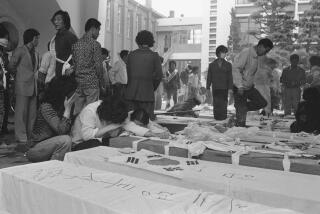Chung Soon-duk, 71; South Korean Communist Fighter
- Share via
SEOUL — Chung Soon-duk, 71, whose bloody capture in 1963 marked the end of South Korea’s prolonged battles against communist guerrillas, died Thursday of a heart attack in Seoul, her advocacy group said in a statement Friday.
Chung, the wife of a peasant farmer, followed her husband into the Chiri Mountains in southwestern South Korea to become a communist guerrilla shortly after the Korean War broke out in June 1950.
They were among thousands of leftist farmers who believed communist North Korean promises of “liberation” from landlords and took up arms in thick forests and jagged ravines.
They kept fighting long after North Korean troops retreated and even after the Korean War ended in 1953 with an uneasy truce.
Her husband died in battle in 1952.
By 1955, most of the Chiri Mountain guerrillas had been killed or surrendered, but Chung and others fought on, raiding police stations and villages, though they had no communication with North Korea.
Chung’s life on the run ended in a shootout with police on Nov. 12, 1963, in which she was shot in the leg.
“Disoriented communist bandit caught!” read headlines at the time. With her arrest, South Korea declared an end to drawn-out operations against peasant “partisans” who had fought the pro-U.S. government in the south.
Chung was released on parole in 1985 after she signed a statement disavowing her ideology.
In a rare interview, she told the Associated Press last August that she had signed the statement in hopes of getting better medical care and a reduced sentence.
She said she still believed in communism and wanted to be sent to North Korea, “my ideological home.”
To her last day, she stuck to her wartime ideological tenets, calling South Korea “a colony of U.S. imperialists.”
Chung had been under constant police surveillance until she was immobilized by a stroke in 1999.
She lived in a hospital, wheelchair-bound, after that.
Hours after she died, North Korea urged the south to repatriate her.
More to Read
Sign up for Essential California
The most important California stories and recommendations in your inbox every morning.
You may occasionally receive promotional content from the Los Angeles Times.










